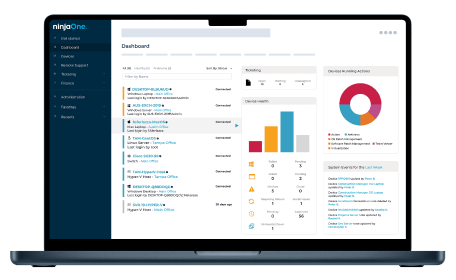HIPAA Compliance Solution Made Simple

Essential Capabilities for HIPAA Compliance
Uncompromising Security
Effortless Compliance
Automated retention policies, built-in audit logs, and centralized management make staying HIPAA-compliant simple and stress-free.
Trusted Transparency
NinjaOne HIPAA Compliance Solution Stands Out
Comprehensive Coverage: SaaS and Endpoints
Immutable Storage to Prevent Tampering
Resilient Multi-Location Storage
Uncompromising Security
Practical Applications for Healthcare Organizations
Legal hold in Healthcare
A hospital under investigation for malpractice must preserve all emails and SharePoint files linked to a physician. With NinjaOne SaaS Backup, IT applies a legal hold, suspending normal retention and ensuring PHI is stored immutably. This prevents deletion, even past retention limits, while keeping data audit ready. Legal teams can then search and retrieve exactly what they need, backed by full activity logs.
SharePoint Collaboration in Clinics
Disaster Recovery Readiness
Audit and Compliance Reporting
Insurance Provider Data Protection
Remote Workforce Data Continuity
Don’t risk compliance gaps!

HIPAA Compliance Solution FAQs
What does HIPAA compliance mean, and why is it important?
HIPAA compliance means following the rules set by the Health Insurance Portability and Accountability Act to protect sensitive patient information (PHI). It ensures that healthcare organizations store, access, and transmit data securely. Compliance is important because it protects patient privacy, prevents data breaches, avoids costly fines, and builds trust between providers and patients.
How does the NinjaOne HIPAA feature protect email backups containing Protected Health Information (PHI)?
NinjaOne protects email backups containing PHI by applying encryption during transfer and at rest, ensuring data cannot be intercepted or exposed. Archived emails are stored in immutable format, preventing tampering or deletion, and retention policies keep them for the legally required period. In addition, role-based access controls restrict who can view or manage the data, and audit logs track every action for full compliance visibility.
What encryption standards are used for HIPAA-compliant email storage?
NinjaOne protects data in transit with TLS encryption validated against FIPS 140-2 compliant cryptographic modules. Communications between devices and the NinjaOne platform use strong ciphers such as ECDHE-RSA with AES-128/256 (GCM or CBC) and SHA-2 (SHA-256/384), all with Perfect Forward Secrecy (PFS). Additionally, NinjaOne uses AES-256 encryption for data at rest.
How are access controls enforced for HIPAA-regulated data?
NinjaOne enforces strict access controls through role-based permissions that limit who can view, restore, or manage backup data. Administrators can assign roles with least-privilege access to ensure users only see the data necessary for their job functions. Access events are fully logged in audit trails, providing visibility and accountability for all user activity. Combined with multi-factor authentication (MFA) support and secure login policies, these controls meet HIPAA’s requirements for protecting PHI against unauthorized access.
What audit trail capabilities are available for HIPAA compliance reviews?
NinjaOne provides comprehensive audit trail coverage by tracking all backup and restore activity with full visibility into who did what and when. This includes detailed records of user actions, timestamps, and restore operations, ensuring accountability at every step. Administrators can easily generate audit-ready reports for compliance reviews or investigations, giving healthcare organizations the visibility and control required to meet HIPAA standards.
How do retention and deletion policies align with HIPAA requirements?
NinjaOne’s backup solutions support customizable retention policies that allow healthcare organizations to preserve data for the legally required timeframes under HIPAA. Backups are stored immutably during the retention period, ensuring PHI cannot be altered or deleted prematurely. Once the retention period expires, secure deletion processes remove the data in a compliant manner, preventing unauthorized access. This alignment ensures that patient information is kept only as long as required, balancing compliance with data minimization and security best practices.
Can HIPAA-compliant archives be searched quickly for specific PHI content?
Yes. NinjaOne’s SaaS backup and archiving solutions include fast, full-text search capabilities that allow administrators to quickly locate specific emails, files, or records containing PHI. Searches can be filtered by user, mailbox, timeframe, or keyword, making it easy to retrieve the exact information needed for patient requests, compliance reviews, or audits. Importantly, all searches respect role-based access controls, ensuring only authorized users can query and view HIPAA-protected data.
How are legal holds managed when PHI is involved in an investigation?
NinjaOne’s solution allows administrators to apply legal holds that suspend normal retention and deletion policies for specific users, mailboxes, or data sets. When a legal hold is active, all relevant PHI is preserved immutably, ensuring it cannot be altered or deleted.
Even if retention periods expire. This helps ensure that critical evidence remains intact and accessible for the duration of an investigation, supporting both HIPAA compliance and legal discovery requirements.
Can HIPAA compliant email archives be exported securely for audits?
Yes. NinjaOne allows administrators to export archived emails when required for HIPAA audits or legal reviews. Export permissions are restricted using role-based access controls, ensuring only authorized personnel can access PHI. All export actions are logged in the audit trail, providing full visibility into who did what and when, which supports HIPAA compliance and accountability.
How does HIPAA compliance differ from GDPR compliance in email archiving?
HIPAA, a U.S. regulation, focuses specifically on protecting Protected Health Information (PHI). In email archiving, this means ensuring messages containing PHI are encrypted, stored immutably, retained for mandated periods, and accessible only to authorized users, with full audit trails for accountability.
GDPR, by contrast, is a European regulation that covers all personal data, not just health information. In email archiving, GDPR emphasizes user rights such as data minimization, consent, the right to access, and the right to be forgotten. This can require organizations to delete or anonymize archived data if requested, which differs from HIPAA’s strict retention requirements.
Who in the organization should have access to HIPAA-protected archives?
Access to HIPAA-protected archives should be strictly limited to authorized personnel with a legitimate need to view or manage PHI. This typically includes compliance officers, designated IT administrators, and specific staff members involved in audits or legal reviews. NinjaOne enforces role-based access controls, allowing organizations to apply the principle of least privilege so users only access the data necessary for their job. All access events are recorded in audit logs, ensuring accountability and compliance with HIPAA’s privacy and security requirements.
How does HIPAA compliance within NinjaOne support healthcare organizations during regulatory inspections?
NinjaOne simplifies regulatory inspections by providing audit-ready visibility into all backup and archiving activity. Detailed audit logs track who did what and when, while immutable storage helps safeguard PHI from alteration or deletion. Customizable retention policies demonstrate compliance with mandated data retention periods, and legal hold capabilities ensure records remain preserved during investigations. Centralized management makes it easy for IT teams to quickly generate compliance reports, proving that PHI is secured, monitored, and accessible in line with HIPAA requirements
What is the difference between HIPAA and GDPR?
The Health Insurance Portability and Accountability Act (HIPAA) is a U.S. law focused on protecting Protected Health Information (PHI). It applies specifically to healthcare providers, insurers, and their business associates, requiring them to safeguard patient data with strict rules around privacy, security, and retention.
The General Data Protection Regulation (GDPR) is a European Union regulation that applies broadly to all personal data, not just health data. It governs how organizations worldwide collect, store, and process the personal data of EU citizens, emphasizing user consent, the right to access or erase data, and cross-border data transfer protections.
Related Resources
HIPAA Compliance: Everything You Need to Know
Master HIPAA compliance with best practices and learn to protect sensitive data.
Top 5 HIPAA-Compliant Cloud Backup Services
What Are the HIPAA Data Backup Requirements?
Discover HIPAA-approved backup methods to meet legal, operational, and security expectations.
